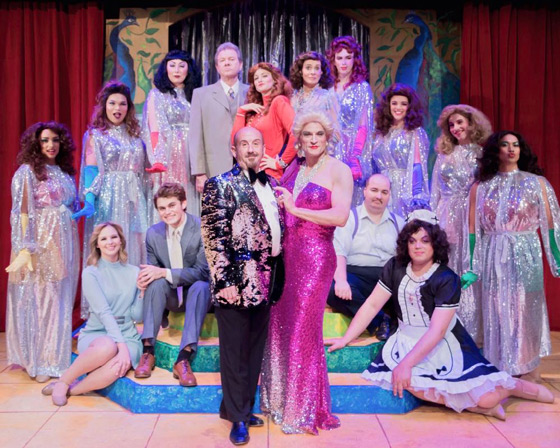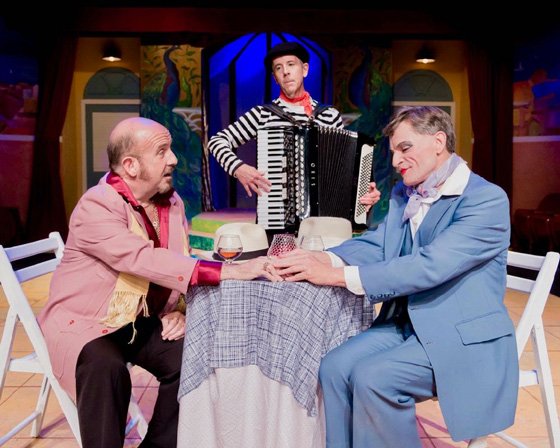by tom andrew –

The mega musical La Cage Aux Folles has been performed all over the world and has been revived three times on Broadway. Winner of numerous Tony Awards, the show is taking its turn on the Long Beach Playhouse stage, running now through Saturday, August 3. The thing most people think of when they hear about La Cage Aux Folles is the 1996 film The Birdcage featuring Robin Williams and Nathan Lane.
A fair assumption, but that film version was not the first, a 1978 Franco-Italian comedy adaptation claims that title. And it wasn’t what sparked the idea for the well-known musical version. The original 1973 French play, written by Jean Poiret, premiered at the Parisian Théâtre du Palais-Royal in February 1973.
The original film and the musical are very, very different from the Williams/Lane adaptation. For one, the musical doesn’t rely on stereotypical, over-the-top screaming homosexual men… well sort of. The humor comes from situations that arise and the way they are handled. It relies on the characters in the show who are not written to be a commentary on what gay life is assumed to be, but what gay life really is.
The musical is filled with comedy, but it also possesses a great deal of heart. So much heart that when done well it can bring more than the occasional tear to one’s eye. Not an easy task, especially considering how it is so much easier to go the sitcom route by making fun of the material.
The show is about long-time couple Georges and Albin, both of whom are quite well-known on the French Riviera waterfront. Georges is the master of ceremonies at his Saint-Tropez drag nightclub and Albin is “Zaza” its famed headliner. The two raised Georges’ son Jean-Michel—from a brief heterosexual fling in Paris—who excitedly returns to the nest to tell his father that he has met Anne, the girl who he intends to marry.
The catch? Jean-Michel explains to Georges that her father is the head of the Tradition, Family and Morality Party and there is no way he will be allowed to marry his daughter. Especially if he knows what Georges and “Zaza” do for a living or that they are in a committed relationship. Though it’s clear that Jean-Michel loves both Georges and Albin, he is in love with Anne and doesn’t want to lose her. But at what expense?
“I believe the message really is about love, and how no matter where you come from, how you were raised, or where you go, love can come from anywhere and be given to anyone. In the current climate, I believe we need this message now more than ever.”
How will Georges tell Albin that he can’t meet Anne’s parents? How can Jean-Michel justify leaving Albin out of something so important? Can Jean-Michel actually rope his birth mother, whom he has never met, to join the “family,” as a stand-in, to show that he is “normal?” How will Albin feel about all of this? Hint: Not happy to say the least!
There are many, many questions that come up, along with many situations that in today’s world probably wouldn’t be tolerated as they were when written. Above all, though, it’s a story all about love.
Long Beach Playhouse Artistic Director Sean F. Gray admits that directing the show was not something he’d even thought of adding to their season. “I will say that it hadn’t crossed my mind until the opportunity presented itself to me,” Gray said.
“As artistic director of the Long Beach Playhouse, I work with a committee. One of the members brought me La Cage, and I was struck with how perfect it would be for us right now, and for our audiences. They tend to run older and be a bit more conservative. I thought this was the right way to challenge their expectations a bit, with issues that they don’t normally see. Plus, I was attracted by the drag and the chance for the fabulous costumes, glitz, and of course, glamour!”
Gray also feels that the message of the show is something that shouldn’t be hidden or something to be ashamed of. The LGBTQ struggle has been going on for years all over the world, and something that is slowly but surely becoming what it should be… acceptable. “Some of the serious issues this play brings up is that love is love,” he offered.
“You shouldn’t have to hide who you are to be more acceptable to others. Real family is something you create, and at the end of the day we are all connected to each other. How often each day do we decide that others are less than us, because they express themselves in a way that is different or love someone in a way that we disapprove of?”
Noah Wagner is playing Albin/Zaza in this production. It’s a role he’s always wanted to play, not just for the glitz and glamour. “The humanity and heart is wonderful,” Wagner shared, “there is plenty of comedy in the piece, too. I think makes it more approachable to people who may not necessarily be fully comfortable with the gay subject matter. Two consenting adults expressing their love is a beautiful thing. I love the diversity of our community and hope as a collective, we can embrace all shades of it. That’s who I think Albin is and that is part of why I love him and wanted to play him. The most important thing about this iconic role is giving him as much humanity as possible.”
In the role of Jean-Michel is actor John Vann, who admits that playing the role has not been easy. It’s clear that he is approaching it with as much realism as possible. “The emotional head space Jean-Michel carries throughout the show can sometimes be quite manic and unpredictable. While adding to the depth of the character, it can be rather vexing to carry on stage,” Vann opined.

“I believe the message really is about love, and how no matter where you come from, how you were raised, or where you go, love can come from anywhere and be given to anyone. In the current climate, I believe we need this message now more than ever. We need to love and be there for each other, no matter where you come from.”
Based on the comments from Gray, Wagner and Vann the show seems in very good hands. All three said more than once that given the world we now live in this piece is what everyone needs.
Wagner’s opinion on what he hopes audiences will take away from the show is something that many, if not all, can agree upon. “My hope is that audiences will remember how unhealthy, and ultimately untruthful, these conscious or unconscious biases are: To affirm that all people are worthy of love, and that they have the right to live the way that they do, regardless of our approval.”
He summed his thoughts on the subject beautifully, “It’s always good to remind ourselves of how important the idea really is, of seeing everyone as human beings worthy of love and existence.”
Long Beach Playhouse is located at 5021 E. Anaheim Street in Long Beach. For tickets and more information, call 562.494.1014 or go to lbplayhouse.org.